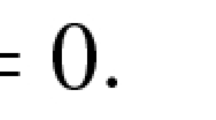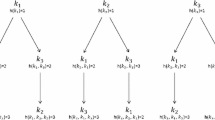Abstract
The purpose of this study is to investigate a relationship between egalitarian equivalence and envy-freeness in a continuum-agent economy, where tastes vary continuously across individuals. Under efficiency, the two criteria of equity are not compatible, except in the knife-edge case. In particular, when individual utility functions are restricted to the class of Cobb–Douglas-type functions, there exists an efficient, egalitarian-equivalent, and envy-free allocation if and only if all individuals have the same taste over commodities.
Similar content being viewed by others
Notes
Pazner and Schmeidler (1978) prove the existence of an egalitarian-equivalent and efficient allocation. For the incompatibility between efficiency and egalitarian equivalence in a social-preference framework, see Tadenuma (2005). Chun et al. (2014) combine egalitarian equivalence with strategy-proofness.
Postlewaite’s argument is incorporated in the work of Daniel (1978, p. 563).
That is, we consider the following Cobb–Douglas utility function with three goods: \(u(x_1,x_2, x_3,t)=\alpha (t) \log x_1 + \beta (t) \log x_2 +(1-\alpha (t)-\beta (t))\log x_3\), where \(\alpha : T \rightarrow (0,1)\) and \(\beta : T \rightarrow (0,1)\) are continuous and differentiable on T. Then Eq. (1) becomes \(\alpha '(t)\log \frac{f_1(t)}{f_3(t)}+\beta '(t)\log \frac{f_2(t)}{f_3(t)}=\alpha '(t)\log \frac{z_1}{z_3}+\beta '(t)\log \frac{z_2}{z_3}\). If \(\alpha '(t)=\beta '(t)\), then we can proceed with the same argument as in the case with two goods. However, under the general case with \(\alpha '(t) \ne \beta '(t)\), our previous argument for two goods is not robust, although the restriction given by (1) is still very restrictive.
References
Cato, S.: Local envy-freeness and equal-income Walrasian allocations. Econ. Lett. 107(2), 239–241 (2010)
Champsaur, P., Laroque, G.: Fair allocations in large economies. J. Econ. Theory 25(2), 269–282 (1981)
Chun, Y., Mitra, M., Mutuswami, S.: Egalitarian equivalence and strategy-proofness in the queueing problem. Econ. Theory 56(2), 425–442 (2014)
Daniel, T.E.: Pitfalls in the theory of fairness–comment. J. Econ. Theory 19(2), 561–564 (1978)
Diamantaras, D.: Envy-free and efficient allocations in large public good economies. Econ. Lett. 36(3), 227–232 (1991)
Foley, D.: Resource allocation and the public sector. Yale Econ. Essays 7, 45–98 (1967)
Kleinberg, N.L.: Fair allocations and equal incomes. J. Econ. Theory 23(2), 189–200 (1980)
Moulin, H.: Fair division under joint ownership: recent results and open problems. Soc. Choice Welf. 7(2), 149–170 (1990)
Pazner, E.A., Schmeidler, D.: Egalitarian equivalent allocations: a new concept of economic equity. Q. J. Econ. 92(4), 671–687 (1978)
Tadenuma, K.: Egalitarian-equivalence and the Pareto principle for social preferences. Soc. Choice Welf. 24(3), 455–473 (2005)
Thomson, W.: On the non existence of envy-free and egalitarian-equivalent allocations in economies with indivisibilities. Econ. Lett. 34(3), 227–229 (1990)
Thomson, W.: Fair allocation rules. In: Arrow, K.J., Sen, A., Suzumura, K. (eds.) Handbook of Social Choice and Welfare, vol. 2, pp. 393–506. Elsevier, Amsterdam (2011)
Thomson, W., Varian, H.: Theories of justice based on symmetry. In: Hurwicz, L., Schmeidler, D., Sonnenschein, D. (eds.) Social Goals and Social Organizations: Essays in Memory of Elisha Pazner, pp. 107–129. Cambridge University Press, Cambridge (1985)
Varian, H.R.: Equity, envy, and efficiency. J. Econ. Theory 9(1), 63–91 (1974)
Varian, H.R.: Two problems in the theory of fairness. J. Public Econ. 5(3–4), 249–260 (1976)
Velez, R.A.: Fairness and externalities. Theor. Econ. 11(1), 381–410 (2016)
Yengin, D.: No-envy and egalitarian-equivalence under multi-object-demand for heterogeneous objects. Soc. Choice Welf. 48(1), 81–108 (2017)
Acknowledgements
I am grateful to Tomoki Inoue, Katsuhito Iwai, Kazuya Kamiya, Tomohiko Kawamori, Toyotaka Sakai, and two anonymous referees of this journal for their many helpful conversations and suggestions. I also thank GATE L-SE for hospitality. This work was financially supported by JSPS KAKENHI (18K01501). This project was also supported by the Postdoctoral Fellowship for Research Abroad of JSPS.
Author information
Authors and Affiliations
Corresponding author
Additional information
Publisher's Note
Springer Nature remains neutral with regard to jurisdictional claims in published maps and institutional affiliations.
Rights and permissions
About this article
Cite this article
Cato, S. Compatibility of egalitarian equivalence and envy-freeness in a continuum-agent economy. Econ Theory Bull 8, 97–103 (2020). https://doi.org/10.1007/s40505-019-00168-2
Received:
Accepted:
Published:
Issue Date:
DOI: https://doi.org/10.1007/s40505-019-00168-2




